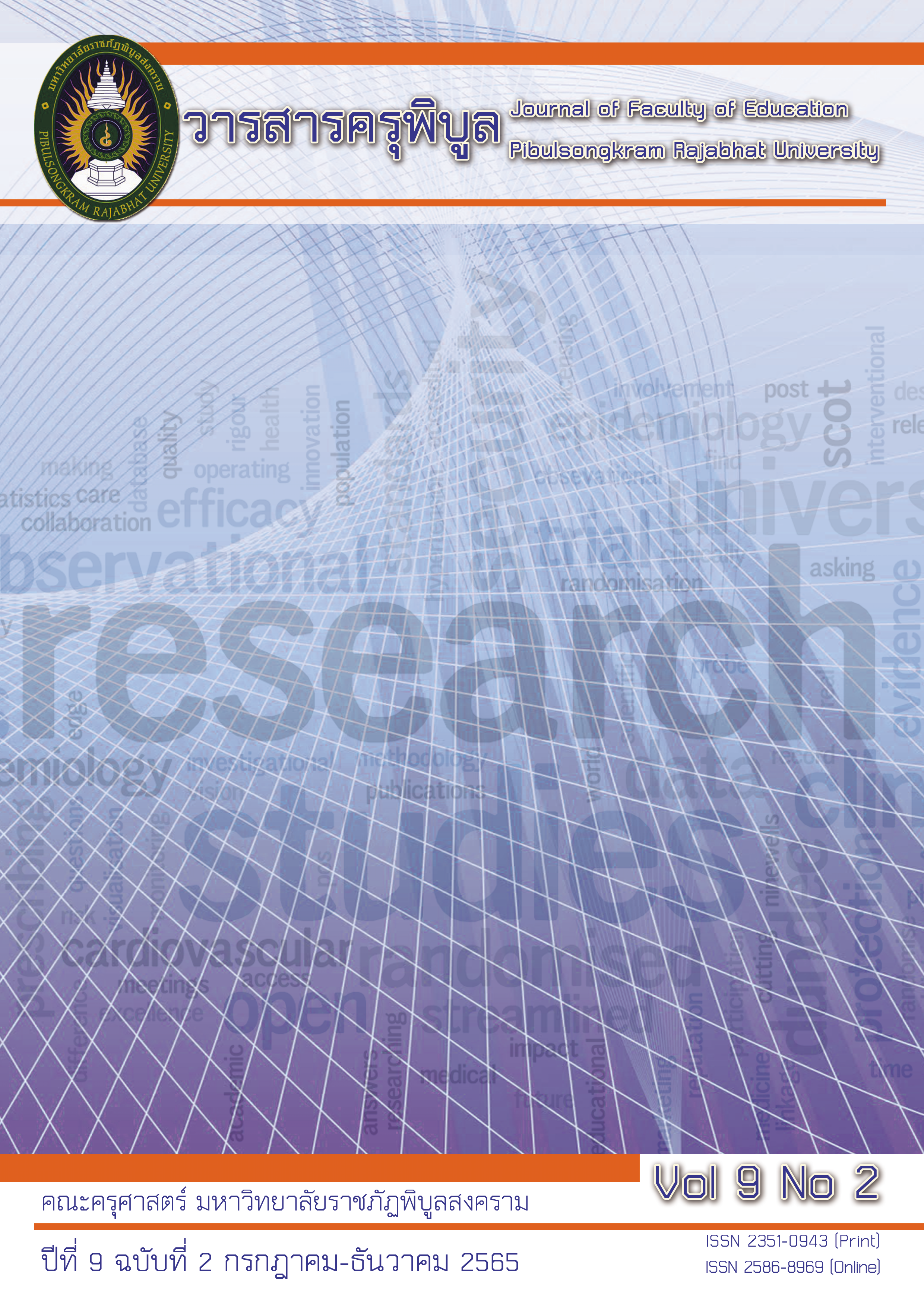THE EFFECTS Of THE SCIENCE ACTIVITIES PROVISION FOR YOUNG CHILDREN BY INTEGRATING DE BONO APPROACH’S THINKING SKILLS OF STUDENTS OF FACULTY OF EDUCATION, KAMPHAENG PHET RAJABHAT UNIVERSITY
ผลการจัดกิจกรรมวิทยาศาสตร์สำหรับเด็กปฐมวัย โดยบูรณาการทักษะการคิดตามแนวคิดของเดอโบโน ของนักศึกษาคณะครุศาสตร์ มหาวิทยาลัยราชภัฏกำแพงเพชร
Keywords:
Science activities, De Bono approach’s, Thinking skillsAbstract
The purposes of this research were to 1) To compare the De Bono approach’s thinking skills of students at the Faculty of Education, Kamphaeng Phet Rajabhat University before and after the science activities provision for young children by integrating the De Bono approach’s thinking skills. 2) To study De Bono’s thinking skill behaviors of young children after the science activities provision for young children by integrating the De Bono approach’s thinking skills and 3) To study students of the faculty of education, Kamphaeng Phet Rajabhat University’s satisfaction of science activities provision for young children by integrating the De Bono approach’s thinking skills. The sample consisted of 1) the sophomores 28 people who enrolled at the second level in the early childhood program 2) the young children 96 people who enrolled at the first-third level at Somruedee Kindergarten. The instruments are used including with young children's science activities provision by integrating the De Bono approach’s thinking skills plans for students, the testing for measuring the ability of students of faculty of education, Kamphaeng Phet Rajabhat University’ De Bono approach’s thinking skills, the learning behavior form, and a satisfaction questionnaire. The quantitative and qualitative data were analyzed by mean, standard deviation, t-test, and reflective teaching form.
The results show that:
1. The students who participated in the science activities provision for young children by integrating the De Bono approach’s thinking skills had posttest mean scores of the De Bono approach’s thinking skills higher than pretest scores (p<.05).
2. Young children who participated in the science activities provision for young children by integrating De Bono's approach’s thinking skills changed De Bono’s thinking skill behaviors in all six areas that were better.
3. The satisfaction overall of The students who participated in the science activities provision for young children by integrating the De Bono approach’s thinking skills was at the highest level.
References
De Bono, E. (1990). Six Thinking Hats. England: Penguin Books.
_________. (1992). Six Thinking Hats for Schools. London: Healer Brownlow Education.
Department of Health: Ministry of Public Health. (2018). Handbook of physical activity and environment conducive to children's physical activity for early childhood care, development and education Thailand. Bangkok: NC Concept Co., Ltd.
Jornburom, Y. (2017). The Effect of Six Thinking Hats Training Program on Higher-Order Thinking Skills of Nursing Students. Journal of Nursing and Education, 10(1), 34-43.
Kanchuaychurn, W. and Onthenee, A. (2019). A Development of Learning Activities Using 7E Learning Cycle with Six Thinking Hats to Develop Critical Thinking Skill for Grade XI Students. The Golden Teak : Humanity and Social Science Journal (GTHJ.), 25(3), 200-212.
Kulnanun, T. (2018). The Results of Using “Brain–DISCOPE” Feature in Early Childhood Development (20 Years Strategy Framework (2017-2035)). Journal of Faculty of Education Pibulsongkram Rajabhat, 5(2), 144-161.
Ministry of Education. (2017). Early childhood education curriculum, 2017. Bangkok: Printing House of the Agricultural Cooperative Federation of Thailand Limited.
National Aeronautics and Space Administration [NASA]. (2018). Engineering Design Process. Retrieved September 5, 2020, from https://www.nasa.gov/audience/foreducators/best/edp.html.
Office of the Education Council. (2021) Early Childhood Development Plan 2021-2027. Bangkok: Prikwan Graphic Co., Ltd.
Piaget, J. (1970) The Child’s Conception of Physical Causality. Totowa, NJ.: Littlefied, Adams.
Polyiem, T. (2018). STEM Education: Introduction to Integrated Classroom. Journal of Faculty of Education Pibulsongkram Rajabhat, 5(2), 122-135.
Srisaart, B. (2002). Introduction to Research. (7th ed.). Bangkok: Suweerayasas Co., Ltd.
Srisuwan, S. and Makjui, A. (2015). The Study of Critical Reading Ability of The Undergraduate Students Using Six Thinking Hats Technique. Veridian E-Journal,Slipakorn University, 8(2), 1238-1250.
Sukhavipat, S., et.al. (2012). Comparison of Pre-school Children’s Creativity and Emotional Quotient Through De Bono’s Approach and Conventional Teaching Approaches. Nakhon Phanom University Journal, 2(1), 43-50.
The Institute for the Promotion of Teaching Science and Technology (IPST). (2020). Learning Framework and Guidelines science, technology, and mathematics learning experiences provision at the early childhood level according to the early childhood education curriculum, 2017. Bangkok: Gogoprint (Thailand) Co., Ltd.
Downloads
Published
Issue
Section
License
Copyright (c) 2022 คณะครุศาสตร์ มหาวิทยาลัยราชภัฏพิบูลสงคราม

This work is licensed under a Creative Commons Attribution-NonCommercial-NoDerivatives 4.0 International License.
ลิขสิทธิ์เป็นของคณะครุศาสตร์ มหาวิทยาลัยราชภัฏพิบูลสงคราม


